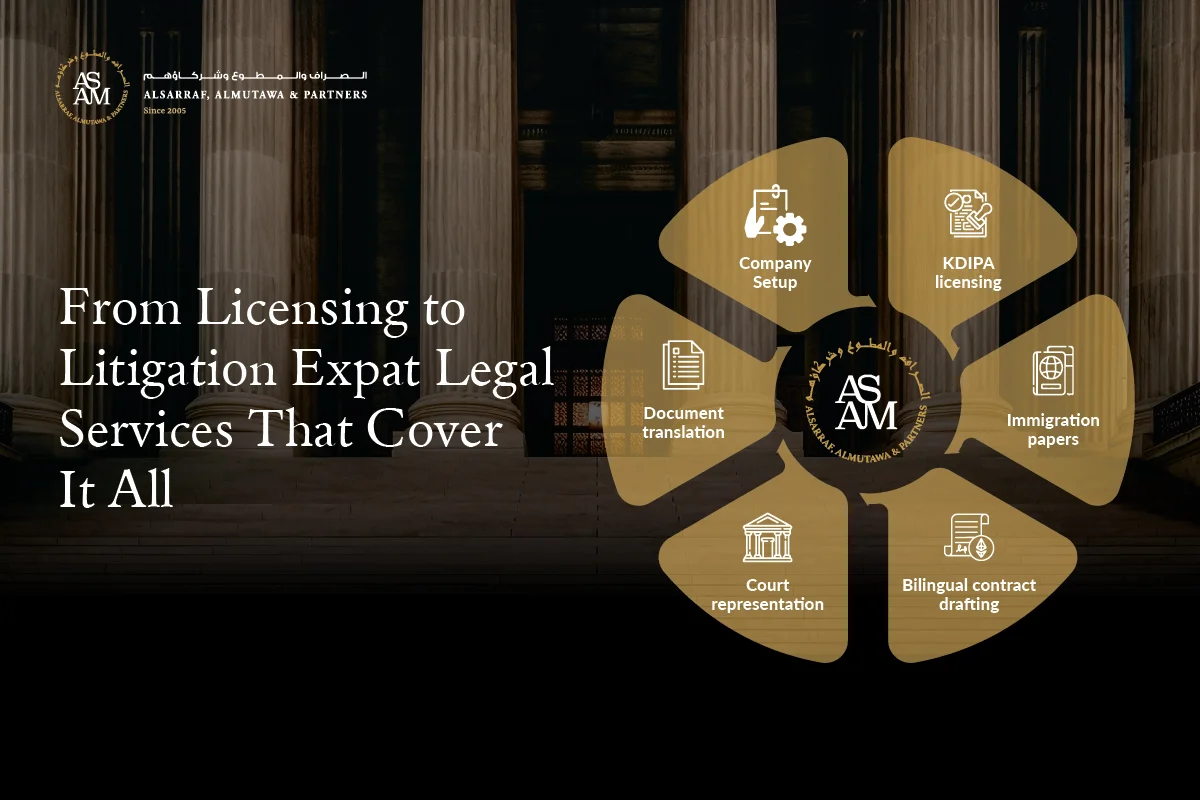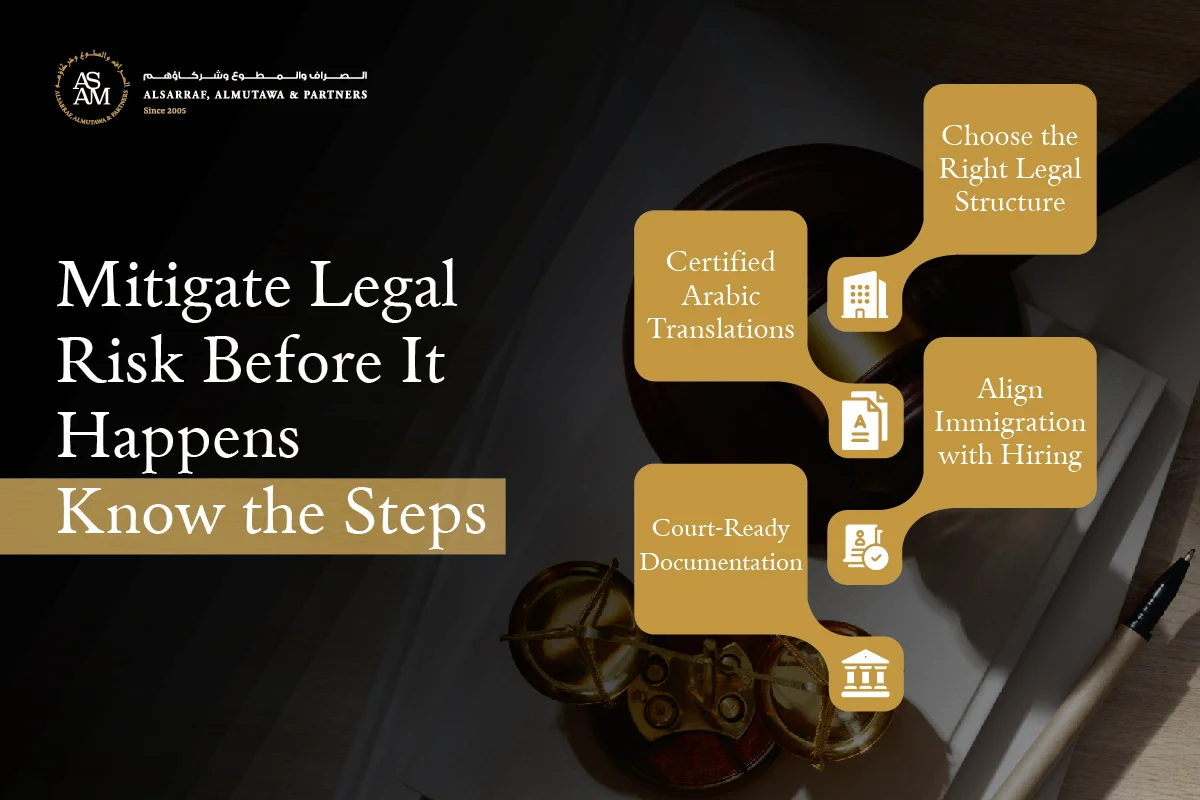

Handling the legal landscape in the State of Kuwait can be complex for non-nationals, making specialized expat legal services in Kuwait a necessity. Courts operate in Arabic, so filings and pleadings must be in Arabic, with certified translations when needed. That’s where bilingual counsel and tight workflows matter. Legal representation for foreigners is a fundamental right and a crucial business requirement. This blog maps the rules, the options, and how expat legal services in Kuwait work in practice.

Expat legal services in Kuwait usually cover market entry, company setup, licensing, immigration, contract drafting, compliance, and representation in court. Local lawyers handle Arabic pleadings, and certified translations are standard for non-Arabic documents. For investors, the KDIPA regime can unlock 100% foreign ownership in approved cases, a branch, or a representative office. These services are part of the broader legal practice areas that support expatriates and foreign investors in Kuwait.
Foreign founders make early choices that are hard to unwind. Entity type, licensing path, language strategy, and dispute planning should be set before the first hire. KDIPA decisions and sector rules shape everything that follows.
Kuwait’s investment law (Law No. 116 of 2013) created KDIPA. With approval, a foreign investor can own up to 100% of a local company, open a branch, or register a representative office for non-commercial activities such as market research and promotion. The executive regulations and recent decisions explain incentives and procedures.
Court practice is different from boardroom practice. Arabic is the working language of the courts. Non-Arabic documents require certified translations to be considered. Bilingual drafting avoids conflicts between the English and Arabic versions.
KDIPA evaluates applications, issues licenses, and administers incentives. It also clarifies which activities qualify and how investors may structure a company, branch, or representative office. KDIPA’s guidance and decisions affect eligibility, required documents, and timelines.
Expatriates can hire counsel for civil, commercial, employment, immigration, and criminal matters. Representation before courts must be by locally licensed lawyers who file Arabic pleadings. Foreign lawyers often support strategy inside international or regional firms but don’t independently appear without meeting local licensing rules.
Here’s the thing: Kuwait’s rules are clear, but the sequence matters. Deal terms, filings, attestations, and translations need to land in the right order. Counsel aligns KDIPA, company law mechanics, and court-ready documentation so nothing jams late.
For clients engaging international law firms in Kuwait or working on global deals, local legal expertise is essential. All cross-border work must meet specific Kuwaiti mandates. The process requires sanctions checks, AML controls, tax analysis for non-residents, and thorough enforceability planning. Counsel will stress-test the forum clause (Kuwait courts vs. arbitration) and ensure awards are enforceable locally. Leading firms flag these checkpoints for foreign investors.
Bilingual contracts should specify which language prevails, then match that choice in court. In practice, Arabic versions tend to lead when a dispute reaches local courts. Firms draft in English for business clarity and finalize Arabic for enforceability. Certified translations connect the two.

The Kuwait Bar Association oversees professional standards for lawyers. Coordination with the Ministry of Justice (Kuwait) affects how filings, certifications, and court processes run. Updates in the legal sector, including nationalization policies for the judiciary, are worth tracking for context.
Shortlist firms with KDIPA wins, bilingual litigation teams, and cross-border depth. Look for evidence in public profiles and guides. Kuwait hosts both local champions and international brands with Kuwait desks.
Ask for examples of KDIPA licenses, branch setups, and bilingual disputes. Reputable blogs and firm pages show who actually does this work. Check if the team includes Arabic-speaking litigators and English-speaking deal lawyers under one roof.
Mid-engagement surprises drain momentum. Request an engagement letter that breaks down scope, translation fees, attestations, and filing costs. Discuss lawyer consultation costs once your roadmap is clear, and get it in writing.
Simple test: send a short bilingual drafting task and see how fast it comes back. Confirm who drafts in English, who finalizes Arabic, and who handles certifications with the courts and MOJ. That reduces rework once filings start.
ASAM & Partners advises expatriates in Kuwait and foreign businesses on company formation, KDIPA licensing, and court strategy. The team coordinates bilingual drafting, certified translations, and Arabic filings so transactions and disputes move without delays.
ASAM & Partners maintains a high level of expertise in supporting foreign direct investment. Their lawyers assist companies with everything from initial market entry strategies to navigating ongoing regulatory compliance. This deep understanding of local commercial law is invaluable for securing long-term success.
When deals span multiple jurisdictions, they work with international counsel to lock down governing law, the seat of arbitration, and enforcement planning, without losing sight of Arabic-language realities inside Kuwait.
The firm has a strong track record of successful outcomes for global clients. These include managing complex international arbitration cases and guiding major multinational mergers. Their success stories show their capability to deliver results against the complexity of the local legal system.
Expatriates and foreign businesses have full rights to hire legal counsel in Kuwait. Securing specialized expat legal services in Kuwait is a strategic move that safeguards your interests. Whether you are an individual navigating residency and immigration law or a corporation dealing with foreign business laws in Kuwait, expert help is available. Don’t let legal complexities discourage your ambitions.
By partnering with a firm that understands all the fine points, you can focus on your life or your business growth. Contact ASAM & Partners today to secure the expert legal representation you need for a confident future in Kuwait.
Can foreigners hire lawyers in Kuwait?
Yes. Foreigners can hire counsel. Court pleadings must be in Arabic, and certified translations are required for foreign-language documents.
Can a foreign investor own 100% of a Kuwaiti company?
Yes, if KDIPA approves under Law No. 116 of 2013. Otherwise, standard formations may involve local participation.
What types of entities can KDIPA approve?
A wholly foreign-owned company, a foreign branch, or a representative office that cannot trade.
Is English accepted in Kuwaiti courts?
Proceedings run in Arabic. Non-Arabic materials must be submitted with certified translations.
Can foreign lawyers appear in Kuwaiti courts?
Foreign lawyers can work in firms but face limits on ownership and courtroom standing unless licensed under local rules. Local counsel leads in court.